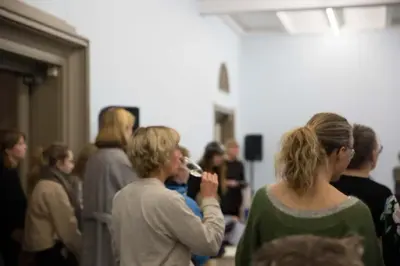Beyond Measure: Forelesningsprogram
- 1/1
Talks: Beyond Measure 6. august 2020: Sophia Efstathiou, Emily Herring, Leah McClimans, Aksel Tjora, Ray Monk, Johan Börjesson.
Program:
14.00: Intro
14.10-14.30: Johan Börjesson - Etter måling
14.35-14.55: Ray Monk Det uutgrunnelige: Wittgenstein om scientisme
15.00-15.20: Emily Herring: Tid hinsides målbarhet: Henri Bergson og intuisjonens kraft
15.25-15.45: Leah McClimans: Målingens verdi og begrensninger
15.50-16.10: Aksel Tjora: Kunnskapsmålingens tragedie
16.15-16.35: Sophia Efstathiou: Å måle hverdagen: found science som analogi til found art
16.35-17.00: Diskusjon
Med forbehold om endringer. Foredragene vil foregå på engelsk.
Leah McClimans: Measuring with Our Eyes Open
We live in an age of evaluation and assessment. Evaluations and assessments are often carried out through measurement. Employers measure employee performance to assess productivity. Administrators and State governments measure student learning to evaluate their progress. Federal agencies measure healthcare and medical technologies to determine their effectiveness, safety, quality and so on. What is it about measurement that makes it so important to such a diverse number of activities?
In this talk I discuss two perceived benefits of measurement. First, it promises a fair, non-partisan approach to decision-making. Second, it saves time and the thinking required for human judgment. Yet I argue that measurement is not a panacea for all decisions. Measurement, similar to human judgement, encodes certain kinds of biases. But worryingly, measurement perpetuates its biases under the guise of objectivity and fairness. Measurement, it turns out, cannot save us from ourselves. There are good reasons to measure, but when we do so we should have our eyes wide open.
Biografi Leah McClimans
Leah McClimans (USA) is an Associate Professor in the Philosophy Department at the University of South Carolina. and co-Director of the Ann Johnson Institute for Science, Technology & Society. Her research interests lie at the intersection of philosophy of medicine and medical ethics. She has authored numerous articles on measurement in quality of life research and clinical ethics. From 2017-2019 she held a Marie Curie ASSISID fellowship at the University College Cork. Before coming to the University of South Carolina she held a post-doctoral fellowship at the University of Toronto’s Joint Centre for Bioethics (2006-7). She also held an Ethox Research Fellowship (2009-2010) at the University of Warwick Medical School. In 2015 she was named a Distinguished Faculty Member in the College of Arts and Sciences at University of South Carolina. She is currently working on a book length manuscript, Patient-Centered Measurement.
Ray Monk: The Imponderable: Wittgenstein on Scientism
“Listen to the science,” Greta Thunberg has repeatedly urged policy-makers. And she is right. When it comes to climate change, our politicians have paid far too little notice of what scientists have been saying to them, with increasing urgency, since the 1970s. In the area of climate change, we should indeed “listen to the science”. In fact, our very survival may depend on it. However, we would all do well to remember that scientific understanding is not the only kind of understanding. Wittgenstein identified two very distinct forms of understanding: the theoretical and the non-theoretical. Scientific understanding is given through the construction and testing of hypotheses and theories; philosophical understanding, on the other hand, is resolutely non-theoretical. What we are after in philosophy, according to Wittgenstein, is “the understanding that consists in seeing connections.” Wittgenstein reminds us, in understanding ourselves, we have to listen to the artists, musicians and writers whose work demonstrates a sensitive grasp of the “imponderable evidence” that will forever elude science.
Biografi Ray Monk
Ray Monk (GB) studied philosophy at the universities of York and Oxford in the UK. His postgraduate work specialised in Wittgenstein’s philosophy of mathematics. He has published biographies of Ludwig Wittgenstein, Bertrand Russell, J. Robert Oppenheimer. He taught philosophy at the University of Southampton from 1992 to 2018. He is now Professor Emeritus there. In his retirement, he has continued to write, concentrating mainly on veganism and climate change.
Emily Herring: Time Beyond Measure: Henri Bergson and the Power of Intuition
In his youth, French philosopher Henri Bergson (1859-1941) became convinced that the ways in which science attempted to measure temporal and psychological phenomena missed something vital about these phenomena. He thought that the very language we use to characterise time denatured it reducing time to space, decomposing movements into static parts, and quantifying qualitative experiences. In a 1903 article, he proposed that the role of philosophy was to go beyond the restrictions of language and beyond the practical requirements of quantification, to access reality itself, in all its mobility. To achieve this, Bergson wished to develop “intuition” as a philosophical method. We will see that in order to understand the reality of time, beyond measurement, Bergson mobilised insights about both life and its evolution, as well as about the special kind of access to reality reserved to artists and poets.
Biografi Emily Herring
Emily Herring (FRA) er en historiker I biologi og filosofi. Hun vokste opp i Paris og mottok en bachelorgrad I filosofi fra Sorbonne i 2012 og en mastergrad i vitenskapsfilosofi fra Paris Diderot University i 2014. Hun fullførte doktorgraden sin på University of Leeds om resepsjonen til Henri Bergsons livsfilosofi blant biologer i det 20. århundret.





